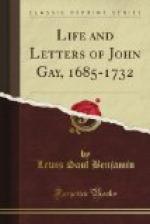So fortune frown’d on me, and I was driven From friends, from home, from Jane, and happy Devon! And Jane, sore grieved when from me torn away;— loved her sorrow, though I wish’d her—gay.
That another girl there was may be gathered from the “Letter to a Young Lady,” who was not so devoted as Jane Scott, for the poet writes:
Begging you will not mock his sighing.
And keep him thus whole years a-dying!
“Whole years!”—Excuse
my freely speaking.
Such tortures, why a month—a
week in?
Caress, or kill him quite in one day,
Obliging thus your servant, John
gay.
[Footnote 1: Risdon: Survey of Devon (1811), p. 243.]
[Footnote 2: Gribble: Memorials of Devonshire.]
[Footnote 3: Gay’s Chair, p. 12.]
[Footnote 4: Gay’s Chair, p. 13.]
[Footnote 5: Notes and Queries, N.S. VI, 488, December 16th, 1882, from the North Devon Herald of December 7th.]
[Footnote 6: Aaron Hill (1685-1750), dramatist and journalist.]
[Footnote 7: Charles Douglas, third Duke of Queensbury and second Duke of Dover (1698-1777), married Catherine, second daughter of Henry Hyde, Earl of Clarendon and Rochester.]
[Footnote 8: Ayre: Pope, pp. 11, 97.]
[Footnote 9: Gay’s Chair, p. 13.]
[Footnote 10: Gay’s Chair, p. 5.]
CHAPTER II
1706-1712
GAY COMMENCES AUTHOR
Gay’s health was improved by his stay in his native town, and presently he returned to London, where, according to the family tradition, he “lived for some time as a private gentleman."[1] Mr. Austin Dobson has pointed out that this is “a statement scarcely reconcilable with the opening in life his friends had found for him";[2] but it may be urged against this view that Gay and his sisters had each a small patrimony.[3] If it is assumed that he returned to the metropolis after he came of age in September, 1706, he may have been possessed of a sum of money, small, no doubt, but sufficient to provide him with the necessaries of life for some little time. When his brother, Jonathan, who had been promoted lieutenant at Cologne by Marlborough, under whom he served at Hochstadt and elsewhere, and captain by Queen Anne, committed suicide in 1709, after a quarrel with his colonel, John may have inherited some further share of the paternal estate.
When Gay was one-and-twenty, ginger was hot in his mouth. Wine, woman, and song appealed to him. It is not on record that he had any love-affair, save those indicated in the verses in “Gay’s Chair”; but the indelicacy of many passages in his writings suggests that he was rather intimately acquainted with the bagnios of the town. No man whose sense of decency had not been denied could possibly have written the verses “To a Young Lady, with some Lamphreys,” and this, even after making allowance for the freedom of the early eighteenth century. He certainly frequented the coffee-houses of Covent Garden and Pall Mall. Also, he roamed about the metropolis, and became learned in the highways and byways, north and south, and east and west—a knowledge which bore excellent fruit in “Trivia.”




